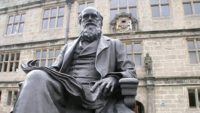By Ken Ham We’re losing the younger generations from the US church. The world is capturing them. You will be excited to learn what AiG is doing about this—and what comes next. Consider these shocking statistics from the USA: In 2010, the Pew Research Center found millennial church attendance was down to 18%. Now, in 2018, GSS Data Explorer showed church attendance with the younger generations was down to 11.3%. And it’s much worse in the rest of the Western world. Loss of the younger generations from the church also corresponds with …read more Source: Ken Ham AIG
By William A. Dembski Today’s ID the Future again features Rice University synthetic organic chemist James Tour and intelligent design pioneer William Dembski. Here in Part 2 they discuss information theory, probability theory, the origin of life, evolution, the multiverse hypothesis, and Dembski’s contributions to the theory of intelligent design. Their conversation is borrowed, with permission, from Dr. Tour’s Science & Faith podcast. Source …read more Source: id the future
By William A. Dembski Today’s ID the Future features Rice University synthetic organic chemist James Tour and intelligent design pioneer William Dembski discussing information theory, information as a meaningful reduction of possibilities, Shannon information versus specified information, and how natural selection has come to function as a God substitute for many scientists, despite the lack of evidence. The conversation is borrowed, with permission, from Dr. Tour’s Science & Faith podcast. Source …read more Source: id the future
By Brandon Clay Though it raises some legitimate concerns, Critical Race Theory’s fundamental assumptions are incorrect because they oppose biblical teaching. …read more Source: AIG Daily
Some academics claim that mathematics could be racist, and that there is such a thing as ‘white math’. …read more Source:
By Dr. David A. DeWitt Our vision of the world merely begins at our eyes. Take a deeper look at the wonders our brain performs every second to help us see. …read more Source: AIG Daily
By Ken Ham Children of all ages are fascinated by God’s creation. Whether it’s the ants crawling along the sidewalk, birds snacking at the feeder in the backyard, fossils in the local creek bed, or the explosive reaction of baking soda to vinegar, God’s creation is full of delight. Would you like to nurture both their curiosity and wonder through the lens of a truly biblical worldview? If so, then consider our popular Explore Camps at the Creation Museum. Campers discover more about God’s creation through a variety of workshops, experiments, scavenger hunts, behind-the-scenes experiences, and much more. Our Explore [More]
By Dr. Joe Francis Ever heard of Volvox? Witness the flawless pirouettes of this single-celled wonder in your local pond scum. …read more Source: AIG Daily
Article highlights: • A genetic mutation is a change—most are bad and some are good. • Evolutionists claim that good mutations come from random processes. • Genetic mutations that demonstrate evidence of being truly random are virtually all deleterious, and many good mutations appear designed. • Both bad and beneficial genetic mutations a… More… …read more Source: icr.org
By Ken Ham We want to say a big “thank you” to military personnel for the challenging work that they do every day. So as our gift, on Memorial Day, May 31, we’re offering all US veterans and military personnel free admission to the Ark Encounter and the Creation Museum. We appreciate the sacrifice that US veterans and active military personnel have made and continue to make for the freedoms we enjoy here in America, and this is just a small token of our thanks. We appreciate the sacrifice that US veterans and active military personnel have made and continue [More]
A sneak preview of the editorial from the soon-to-be-released Creation magazine. Subscribers will be delighted with the magazine’s powerful content and brilliant graphics. …read more Source: creation.com
In order to have evolution, you must first have life. Both sides of the evolution-creation debate agree that the chance of all the correct biomolecules coming together by chance to form even the simplest cell is virtually impossible. Fred Hoyle1 (an atheist) estimated the probability as one chance in 1040,000. He compared the likelihood of life originating on Earth to that of a tornado going through a junkyard and assembling… More… …read more Source: icr.org
By Ken Ham This month marks the one-year anniversary of our God-honoring streaming platform, Answers TV! We’re so excited that we now have our own platform to host our video content, which now features over 3,000 videos, including hands-on science, adventure programs, nature shows, and kids programming. It’s been very popular, and our subscriber count continues to grow. Since we first launched Answers TV, we’ve added hundreds of videos, created apps for TVs, phones, and more, and introduced original shows exclusive to Answers TV. Since we first launched Answers TV, we’ve added hundreds of videos, created apps for TVs, phones, [More]
By Ken Ham Since 1952, the first Thursday of May has been the National Day of Prayer in the United States. Each year, the president issues a proclamation regarding this special day of prayer and petition to the Lord for this nation. Well, President Biden released a proclamation, that, for the first time in the 69-year history of the National Day of Prayer, did not mention the words God, Creator, Jesus, or any other name for the Godhead. President Biden released a proclamation that, for the first time in the 69-year history of the National Day of Prayer, did not [More]
Megafloods cause rapid, layered sedimentation and demonstrate that the Genesis Flood was capable of depositing the continental sedimentary rocks. …read more Source: creation.com
By Ken Ham We’re hiring at Answers in Genesis, the Creation Museum, and the Ark Encounter—and we need you! When you join our team, you will get to be part of the incredible work the Lord is doing through this ministry, as well as part of a group of like-minded believers. And you’ll also enjoy a variety of employee perks. Of course, the greatest “perk” of working at the AiG ministry, or at either of our two themed attractions, is that you get to be part of sharing the message of biblical authority and the gospel with millions of people [More]
By Ken Ham Experience the glory of God displayed in the nighttime sky with unique biblical-worldview-based Astronomy Live programs at the Creation Museum in northern Kentucky. These fascinating programs are taught by our resident astronomer, Dr. Danny Faulkner, a former astronomy professor who is very knowledgeable about the night sky (and has a great sense of humor!). An Astronomy Live program allows you to experience the constellations inside our state-of-the-art planetarium (where clouds and weather are never an issue!). An Astronomy Live program allows you to experience the constellations inside our state-of-the-art planetarium (where clouds and weather are never an [More]
By Geoffrey Simmons On this ID The Future from the vault, host Casey Luskin interviews Dr. Geoffrey Simmons, author of Billions of Missing Links*. In the book Simmons shows that as modern science has progressed from the visible to the invisible (from the macroscopic to the biomolecular and biochemical) the numbers of missing evolutionary links have skyrocketed. Every new discovery brings many more questions than answers, and ever more evidence that blind evolution cannot explain the origin of life’s astonishingly sophisticated biological designs. (*As an Amazon Associate, Discovery earns from qualifying purchases.) Source …read more Source: id the future
By Ken Ham Earlier this year we hosted our very successful and greatly impactful Answers for Women conference, featuring teaching from Dr. Georgia Purdom, Justin Peters, Heidi St. John, Phil Johnson, and me—and many more. It was an excellent conference, with 94% of attendees sharing they’d recommend the conference to others, and 88% saying they want to come back again to this yearly event! And the rich, “meaty” teaching is now available for subscribers to stream on Answers TV. It’s an incredible resource for you and your family to help you grow in the knowledge of God’s Word and build [More]
By Ken Ham Religious persecution is already here in the West—and it’s increasing. Now, some Christians will cry “foul” on this, pointing to the much worse religious persecution currently happening in countries such as China. But intense persecution doesn’t usually begin overnight—it begins with small acts of persecution and discrimination, such as that which recently took place in Finland. Once such “doors” are opened, then they are pushed open more and more over time. This MP is now being charged with three hate crime counts and can face up to six years in prison if convicted—for speaking the truth about [More]
Is science independent of Scripture? …read more Source: creation.com
By Ken Ham The world tries to make humans equal in many different areas. So, are we all equal? What is true equality? 1. Biologically Really, the modern LGBTQ movement is a push to make humans equal biologically. Supposedly, males can be females, and females can be males. However, biologically (and genetically), males and females are different. Our sex chromosomes confirm what God stated in his Word that “from the beginning of creation, ‘God made them male and female’” (Mark 10:6). Women bear children—men cannot. Certainly there are many things men and women can equally do, but the Bible makes [More]
In Walton’s view no one can truly understand the meaning of Genesis 1-3 unless they view the text through worldview lenses informed by Ancient Near East literature. …read more Source: creation.com
By Eric Hedin On today’s ID the Future, host Eric Anderson sits down with Canceled Science* author and physicist Eric Hedin to discuss Hedin’s new book and, in particular, the book’s take on the origin-of-life problem. Hedin says the second law of thermodynamics poses a serious problem for the idea of a mindless origin of the first single-celled organism from prebiotic materials. Such an event would have involved a breathtaking increase in new information, and Hedin says that physics tells us pretty clearly that mindless nature degrades information; it doesn’t create it. Are there workarounds? Listen in as he explains [More]
By Avery Foley I asked Avery Foley, a writer and speaker with Answers in Genesis, to interview my wife, Mally, on her perspective of the history of the AiG ministry and the Ham family. …read more Source: AIG Daily
By Ken Ham Chapter 1 of One Race One Blood: How Darwinian evolution inspired new forms of racism in Western civilization, resulting in untold human suffering and destruction …read more Source: AIG Daily

















![Something Got A-Hold of Me [Live] – Janet Paschal Something Got A-Hold of Me [Live] – Janet Paschal](http://img.youtube.com/vi/Wt4PyEFlf6Q/0.jpg)
























